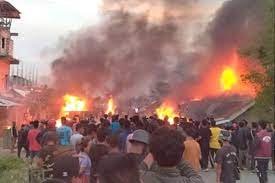In the aftermath of a series of ethnic clashes that plunged Manipur into chaos, a fragile calm prevailed on May 7, four days after the violence erupted. The State found itself grappling with the aftermath, as thousands sought refuge in neighboring northeastern states or were evacuated from conflict zones by their respective governments. While the situation showed signs of improvement, the decision was made not to restore mobile internet services in Manipur, according to the state’s newly appointed security advisor, Kuldiep Singh.
The recent wave of violence in Manipur highlighted deep-rooted tensions and conflicts among different ethnic groups residing in the region. The clashes triggered widespread fear and instability, leading to a significant number of people seeking safety elsewhere. Many sought refuge in neighboring states, where they received support and assistance from the local administrations. The governments of these states worked in tandem to ensure the safe evacuation of affected individuals and provide them with necessary aid.
As the situation gradually improved, some areas saw relaxations in the imposed curfew. This development provided a glimmer of hope to the residents, indicating a potential return to normalcy. However, the state administration, in consultation with the newly appointed security advisor, decided against restoring mobile internet services. The decision was likely made to prevent the spread of misinformation or hate speech that could potentially reignite tensions and exacerbate the fragile situation.
The absence of mobile internet connectivity presented its own set of challenges for the residents of Manipur. Communication channels were severely hampered, making it difficult for people to stay connected with their loved ones or access important information. However, the decision to prioritize peace and stability over immediate connectivity reflected a cautious approach aimed at preventing further violence and allowing authorities to effectively manage the situation on the ground.
The unrest in Manipur underscored the urgent need for dialogue and reconciliation among the various ethnic groups inhabiting the region. Efforts to foster inter-community understanding, promote tolerance, and address the root causes of conflicts must be prioritized to prevent future outbreaks of violence. The state government, civil society organizations, and community leaders need to work together to create a conducive environment for dialogue, where grievances can be addressed and long-standing issues resolved through peaceful means.
In addition to inter-community dialogue, it is imperative to strengthen law enforcement and security measures in Manipur. The newly appointed security advisor, Kuldiep Singh, holds a crucial role in formulating strategies to maintain peace and stability. His experience astate administration towards effective implementation of measures aimed at preventing further violence and maintaining law and order.
Furthermore, the support and involvement of the central government in addressing the situation in Manipur is vital. Collaborative efforts between the state and central authorities can ensure the allocation of adequate resources and assistance required to rebuild trust, restore normalcy, and promote sustainable peace in the region.
As Manipur emerges from the dark shadow of ethnic violence, it faces the arduous task of healing wounds, rebuilding shattered lives, and preventing the recurrence of such conflicts. The journey towards lasting peace will require concerted efforts from all stakeholders involved. By fostering dialogue, implementing effective security measures, and addressing the underlying causes of conflicts, Manipur can pave the way for a harmonious and prosperous future for its diverse communities.


